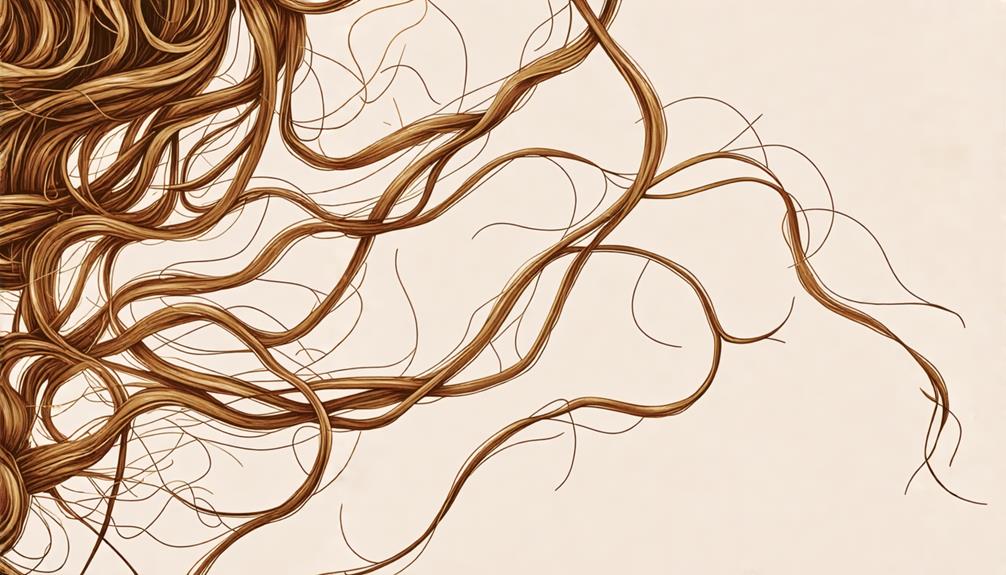You take great care to style and maintain your natural hair, but somehow, those pesky breakages still occur. You're not alone – many people struggle with hair strands that seem to snap at the slightest touch. But what's behind this frustrating phenomenon? It all starts with the structure of your hair, specifically the cuticle and cortex, which can be damaged by excessive heat styling, chemical treatments, and harsh products. As you consider your own hair care habits, you may wonder: what other factors contribute to breakage, and how can you prevent them?
Understanding Natural Hair Structure
Your natural hair is made up of several layers, with the outermost layer, known as the cuticle, playing a crucial role in its overall health and resilience. You might not know it, but the cuticle is responsible for protecting the inner layers from damage. It's like a shield that guards your hair's delicate inner structures.
Underneath the cuticle lies the cortex, which is the thickest layer of your hair. The cortex contains melanin, the pigment that gives your hair its color. It's also where you'll find keratin, a protein that provides strength and elasticity to your hair. When your hair is healthy, the cortex is flexible and can withstand stress without breaking.
Causes of Hair Strand Breakage
Damage to the cuticle and cortex can trigger a cascade of events that ultimately lead to hair strand breakage. When you expose your hair to excessive heat styling, chemical treatments, or harsh products, the cuticle lifts, and the cortex becomes vulnerable to cracks and splits. As a result, the hair strand's structural integrity is compromised, making it more susceptible to breakage.
Moreover, daily wear and tear, such as combing, brushing, and friction from clothing or accessories, can cause hair strands to snap. Additionally, factors like genetics, hair porosity, and environmental conditions can contribute to breakage. For example, low humidity can dry out your hair, leading to brittleness, while excessive sun exposure can cause photodamage.
Poor hair care habits, like tight hairstyles, using rough combs, or handling wet hair roughly, can also cause hair strands to weaken and break. You need to be mindful of your hair care routine to mitigate these risks and reduce hair breakage. Remember that breakage is not inherent to natural hair itself; it's a symptom of internal or external damage. Addressing the causes of hair breakage will help you understand and overcome this challenge.
Minimizing Daily Hair Damage
To keep hair strands intact, vitally, you must adopt gentle hair care habits that minimize daily wear and tear, starting with the way you handle your hair while combing, brushing, or styling. When you're rough with your hair, you cause micro-tears that lead to breakage. So, be gentle when combing or brushing your hair, especially when it's wet. Use a wide-tooth comb or a detangling brush to gently work out tangles, starting from the ends and working your way up.
You should also minimize heat styling, as it can cause substantial damage to your hair. When you do use heat styling tools, use a heat protectant to shield your hair from the heat. Additionally, avoid tying your hair too tight, as this can cause hair breakage due to tension on the hair follicle. Try to minimize your use of hair accessories that can cause friction and lead to breakage. By being mindful of these daily habits, you can markedly reduce hair breakage and keep your hair strands intact. Remember, gentle hair care is key to maintaining healthy, strong hair.
Hair Care Product Selection Tips
Choosing the right hair care products can make or break the health and stability of hair strands, and selecting products with the fewest, most gentle, and effective ingredients is the best way to support ongoing hair growth and prevent unwarranted breakage; this makes careful evaluation before purchasing hair products extremely important. When shopping for hair care products, you should read labels carefully, looking for ingredients that are known to nourish and protect hair, such as coconut oil, shea butter, and argan oil. Avoid products containing harsh chemicals, like sulfates, parabens, and silicones, which can strip hair of its natural oils and cause damage.
You should also consider your hair type and specific needs when selecting products. For example, if you have dry or damaged hair, you may want to look for products with moisturizing ingredients, while oily hair may benefit from products with balancing properties. By choosing products that are tailored to your hair's needs, you can help promote healthy hair growth and prevent breakage. By being mindful of the products you use, you can take a significant step towards achieving stronger, healthier hair.
Regular Maintenance for Strong Hair
While selecting the right hair care products is a vital step towards achieving strong, healthy hair, you also need to establish a regular maintenance routine to keep your hair thriving. You'll want to start by setting aside dedicated time each week for hair care. This could be as simple as an hour on the weekend, where you focus on washing, conditioning, and styling your hair.
During this time, make sure to gently detangle your hair, working from the ends up to prevent breakage. You should also be using a wide-tooth comb or your fingers to minimize damage. When you're not actively styling or washing your hair, keep it protected with a satin or silk scarf, and avoid using harsh chemicals or heat styling tools too frequently. By prioritizing regular maintenance, you'll be able to identify and address any potential issues before they cause significant damage to your hair. This proactive approach will help you achieve stronger, healthier hair over time. Remember, consistency is key to seeing noticeable improvements in your hair's health.
At a Glance
You've learned that natural hair strands break easily due to damage to the cuticle and cortex. To prevent breakage, you must adopt gentle hair care habits and choose effective products. By minimizing daily damage, selecting the right products, and performing regular maintenance, you'll be on your way to promoting healthy hair growth and reducing breakage. Remember, taking care of your natural hair requires effort and patience, but the results are well worth it. Additionally, it’s important to understand why frizzy hair occurs and how to combat it. Frizz is often caused by moisture imbalance, heat damage, and rough treatment of the hair. By using moisturizing and smoothing products, protecting your hair from excessive heat, and being gentle when styling, you can help manage and prevent frizz. With consistent care and attention, you can maintain healthy, strong, and beautiful natural hair.






